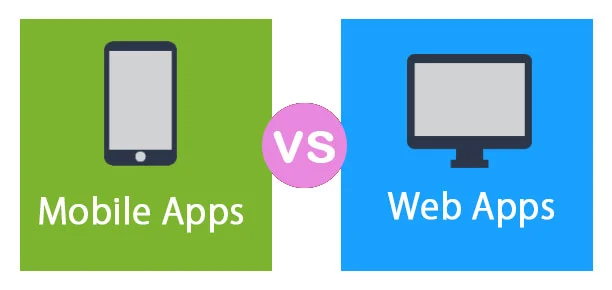Startups and established businesses alike often face a common dilemma: Should we build a web app or a mobile app first? It’s a pivotal decision—one that can influence user engagement, market reach, development costs, and even the long-term success of your product.
Whether you’re a founder bootstrapping your MVP, a product manager in a SaaS company, or a startup pitching to investors, understanding the pros, cons, and strategic implications of this decision is critical.
In this comprehensive guide, we’ll explore:
- Definitions of web and mobile apps
- Core differences between the two
- Key considerations for choosing one over the other
- Business cases for each
- Real-world examples
- A strategic decision framework
Let’s dive in.
What Is a Web App?
A web app is a software application that runs in a web browser and can be accessed via URLs. It is typically built using front-end technologies like HTML, CSS, and JavaScript, and powered by back-end frameworks like Node.js, Django, or Ruby on Rails.
Examples include:
- Google Docs – a powerful word processor accessible from any browser
- Slack’s Web Client – for team messaging without needing a download
- Trello – a kanban-style productivity app accessible via web
Benefits of Web Apps
- Platform agnostic: Works across all devices with a modern browser (desktop, tablet, mobile)
- Faster to build and iterate: No App Store approval cycles
- Lower cost of development: One codebase for all users
- SEO advantages: Can be indexed by search engines
- Easy updates: Users always access the latest version
What Is a Mobile App?
A mobile app is a software application developed specifically for mobile devices like smartphones or tablets. Mobile apps are generally downloaded via platforms like the Apple App Store or Google Play Store.
There are two main types:
- Native apps: Built specifically for iOS (using Swift/Objective-C) or Android (using Kotlin/Java)
- Cross-platform apps: Built using frameworks like Flutter or React Native that work across both platforms
Examples include:
- Instagram – primarily a mobile-first experience
- WhatsApp – mobile messaging with native device integrations
- Uber – mobile ride-hailing with GPS and push notifications
Benefits of Mobile Apps
- Superior performance: Optimized for device hardware
- Access to native features: Camera, GPS, push notifications, biometrics
- Offline functionality: Often works without an internet connection
- Stronger user retention: Thanks to push notifications and presence on home screen
- Higher engagement rate: Users tend to spend more time on mobile apps
Web App vs. Mobile App: 8 Key Considerations
1. Target Audience
- If your users are primarily desktop users (e.g., professionals, B2B users), start with a web app.
- If your users are on-the-go consumers (e.g., social, delivery, lifestyle apps), a mobile app may serve better.
Pro Tip: Use Google Analytics or user research to identify your primary access platform.
2. Time-to-Market
- Web apps are generally faster to develop due to:
- No app store review process
- Single codebase
- Easier QA testing across devices
If you’re racing to launch an MVP, a web app can get you to market in weeks instead of months.
3. Budget Constraints
- Building for iOS and Android separately means two development tracks, increasing cost.
- Even with cross-platform tools, mobile app development often requires:
- Device testing
- App store optimizations
- Ongoing compliance with Apple and Google’s changing policies
Web apps are 30–40% cheaper to build initially than mobile apps, depending on complexity.
4. User Engagement & Retention
- Mobile apps enable push notifications, deep linking, and personalized user experiences—all of which improve retention.
- If long-term engagement and retention are your priorities (think fitness or finance apps), mobile might be the way to go.
5. Functionality & Performance
Ask yourself:
“Does my product require access to device features like GPS, camera, or Bluetooth?”
If yes, mobile app development becomes a necessity.
Otherwise, modern web apps (especially PWAs) are increasingly capable, offering offline support, push notifications, and fast performance.
6. Maintenance & Scalability
- Web apps have a centralized update model—you deploy once, and all users have the latest version.
- Mobile apps require maintaining:
- Multiple versions
- Store listings
- Backward compatibility
Web apps win in maintainability unless your mobile app becomes your primary product.
7. Distribution & Discovery
- Web apps rely on SEO, referrals, and direct marketing.
- Mobile apps benefit from App Store discovery and curated placements—but also face competition from millions of other apps.
Launching a web app first allows faster traction testing without the app store bottlenecks.
8. Monetization Model
Your revenue goals may affect your decision:
- Web app monetization: SaaS subscriptions, ad placements, affiliate links
- Mobile app monetization: In-app purchases, ads, freemium upgrades
If your monetization model involves microtransactions or ad-based revenue, mobile apps may generate more revenue per user.
When to Build a Web App First
You should prioritize a web app if:
- You want to launch an MVP quickly
- Your audience includes desktop-heavy users (e.g., B2B SaaS)
- You’re operating on a lean startup budget
- SEO visibility matters to your growth strategy
- Your app doesn’t rely heavily on native device features
Examples:
- Notion started as a powerful web-first productivity tool
- Airtable gained traction on desktop before rolling out mobile apps
When to Build a Mobile App First
Choose to build a mobile app first if:
- Your users are mobile-first or mobile-only
- Push notifications and native features are essential to your product
- You’re competing in a mobile-first market (e.g., on-demand services, fitness apps)
- Your revenue model is in-app purchases or ads
- You’re aiming for high user retention and engagement
Examples:
- Instagram launched as iOS-only before expanding to Android and web
- Uber needed real-time location and native device features from day one
Hybrid Approach: Progressive Web Apps (PWAs)
If you’re on the fence, Progressive Web Apps (PWAs) offer a middle ground:
- Accessible via browser but installable on mobile
- Offer offline functionality, push notifications, and fast loading
- Can be a great MVP solution before investing in full native apps
Tech stack examples:
- React + Firebase
- Vue.js + Laravel
- Next.js + Supabase
Decision Framework
Here’s a quick framework to guide your decision:
| Criteria | Web App | Mobile App |
|---|---|---|
| Launch Speed | ✅ Faster | ❌ Slower |
| Development Cost | ✅ Lower | ❌ Higher |
| Accessibility | ✅ Cross-platform | ❌ Platform-specific |
| Native Features | ❌ Limited | ✅ Full Access |
| User Engagement | ❌ Browser-based | ✅ Higher (Push, UX) |
| SEO Visibility | ✅ Strong | ❌ None |
| Offline Capability | ❌ Limited | ✅ Robust |
| App Store Discovery | ❌ No | ✅ Yes |
There is no one-size-fits-all answer when deciding between a web app and a mobile app. The right choice depends on your audience, business goals, technical requirements, and available resources.
At Poterby Tech, we help startups and enterprises assess these trade-offs and build custom solutions tailored to their strategic goals. Whether you’re planning a web-first SaaS platform or a mobile-first lifestyle app, our team can guide your product development journey from concept to launch.
Need help deciding or building?
📩 Contact us today for a free product consultation.




